#Howard E. Rollins Jr.
Text
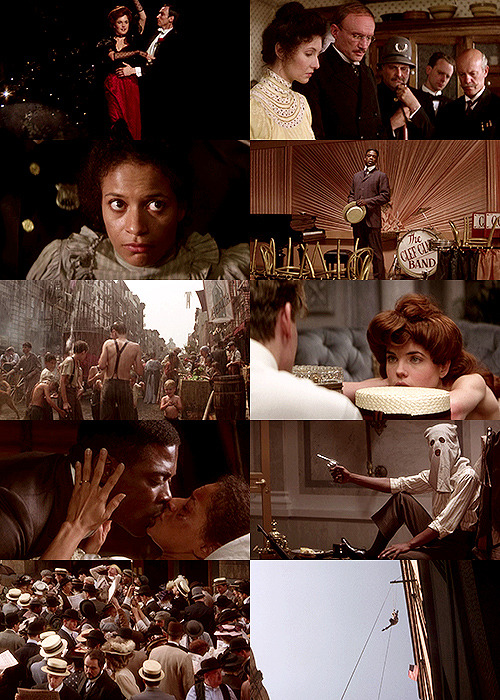
Ragtime (1981). A young black pianist becomes embroiled in the lives of an upper-class white family set among the racial tensions, infidelity, violence and other nostalgic events in early 1900s New York City.
It's impossible to argue with the fact that Miloš Forman knew how to make good cinema, but more than that, he really knew how society and culture informed a character's interior life, from their personal conflicts to their relationships to how they navigated the world around them. We saw it in One Flew Over the Cuckoo's Nest and Hair, but I think nevermoreso than here, which feels ahead of its time in its nuanced approach to white privilege and the social structures that silence people. Plus the cast is absolutely stacked, I can't believe I didn't know more about this going in. 8/10.
#ragtime#1981#Oscars 54#Nom: Supporting Actor#Nom: Supporting Actress#Nom: Adapted Screenplay#Nom: Score#Nom: Song#Nom: Costume#Nom: Art Direction#Nom: Cinematography#milos forman#e.l. doctorow#michael weller#heinrich von kleist#james cagney#elizabeth mcgovern#Howard E. Rollins Jr.#brad dourif#moses gunn#mandy patinkin#mary steenburgen#debbie allen#1900s#america#american#class#race#8/10
27 notes
·
View notes
Text
Oscar Nominee of All Time Tournament: Round 1, Group A
(info about nominees under the poll)
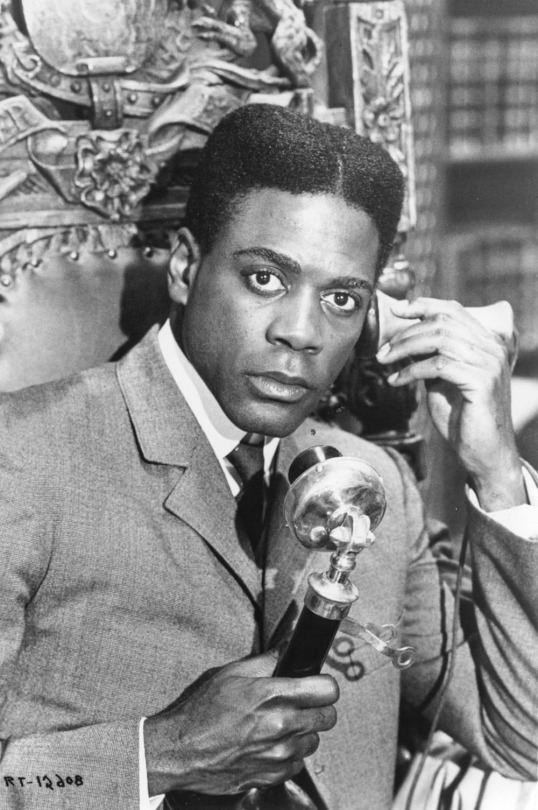
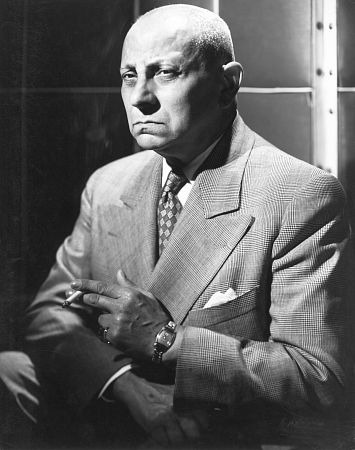
HOWARD E ROLLINS JR (1950-1996)
NOMINATIONS:
Supporting- 1981 for Ragtime
--
ERICH VON STROHEIM (1885-1957)
NOMINATIONS:
Supporting- 1950 for Sunset Boulevard
#oscars#academy awards#oscar nominees#actors#film#howard e rollins jr#ragtime#ragtime 1981#erich von stroheim#sunset boulevard#nominees group a#nominees group a polls
5 notes
·
View notes
Text
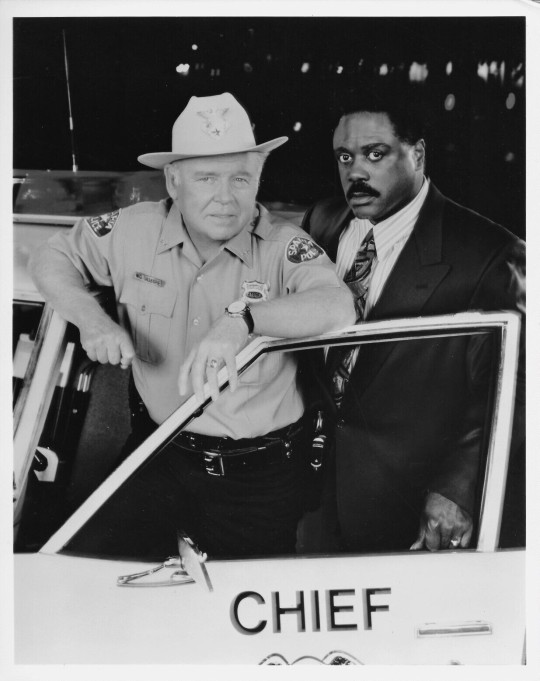
Carroll O'Connor + Howard E. Rollins Jr. on "In the Heat of the Night" (CBS, 1988-1995)
2 notes
·
View notes
Text
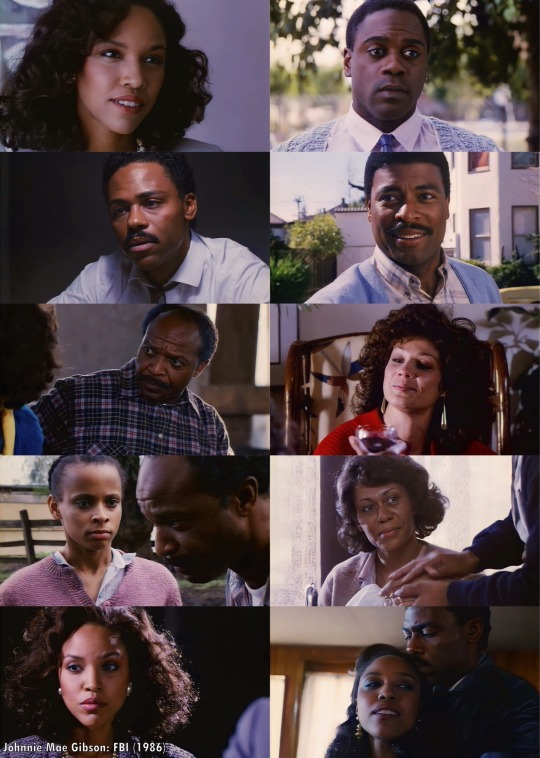
"Johnnie Mae Gibson: FBI" (1986) is a CBS television movie directed by Bill Duke based on the life story of the first African-American female FBI agent chosen to work undercover.
Director: Bill Duke
Writer: James G. Hirsch
Starring Lynn Whitfield, Howard E. Rollins Jr., Richard Lawson, William Allen Young, Marta DuBois, John Lehne, Hugh Gillin, Henry G. Sanders, Veronica Redd, Eb Lottimer
Storyline
Johnnie Mae Gibson was the first African American female FBI agent chosen to work undercover. Her drive and ambition plunge her into the dangerous underworld of wealth, glamour, and guns. Forcing her family to take a backseat to her dreams and professional goals, Johnnie is determined to crack the case and gain the respect and admiration of her FBI co-workers. But, along the way, she makes a terrible mistake that may cost Johnnie her career.
It is available on DVD but is expensive and out of print. The entire movie is on YouTube
0 notes
Video
youtube
Howard E Rollins Jr|He DIED 27 YEARS ago| Now His Family Confirmed the ...
0 notes
Text
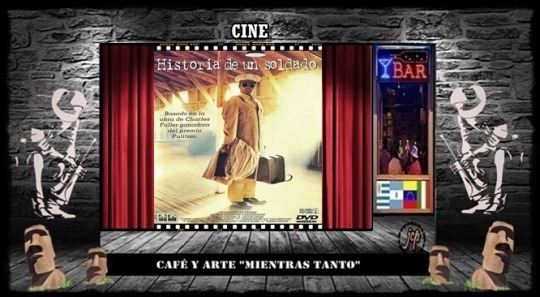
CINE
Historia de un soldado (1984)
Título original: A Soldier's Story
Estados Unidos
Dirección: Norman Jewison
1)Idioma: Doblada al Español
2)Idioma: Inglés
Atención: Solo para ver en PC o Notebook
Para ver el Film pulsa el Link:
https://artecafejcp.wixsite.com/escenario-cafejcp/post/historia-de-un-soldado-1984
Reparto: Howard E. Rollins Jr., Adolph Caesar, Art Evans, David Alan Grier, David Harris, Dennis Lipscomb, Larry Riley, Robert Townsend.
Género: Racismo. Años 40. Drama judicial
Sinopsis: Segunda Guerra Mundial (1939-1945). En el año 1944, un sargento negro es asesinado en una carretera solitaria cerca de la base militar de Louisiana. Debido a la presión ejercida por las autoridades y por la opinión pública el ejército envía al capitán Davenport, un abogado también de raza negra, para que se encargue de la investigación.
Críticas:
"El carisma de Rollins hace maravillas, y Jewison revela suficiente profesionalidad sólida en el hábil manejo de los flashbacks para convertirla en un entretenimiento apasionante."
-Time Out
"Un perspicaz drama de época, así como un estudio de personajes
totalmente atractivo."
-TV Guide
Premios:
1984: Oscar: 3 Nom. a Mejor película, actor sec. (Adolph Caesar), guión adaptado
1984: Globos de Oro: 3 nominaciones, incluyendo Mejor película drama
1984: Sindicato de Directores (DGA): Nominada a Mejor director
1984: Sindicato de Guionistas (WGA): Nominada a Mejor guión adaptado
1984: Asociación de Críticos de Los Angeles: Mejor actor secundario (Caesar)
1984: Asociación de Críticos Norteamericanos (NBR): Nominada a Mejores
10 películas.
Café Mientras Tanto
jcp
0 notes
Photo
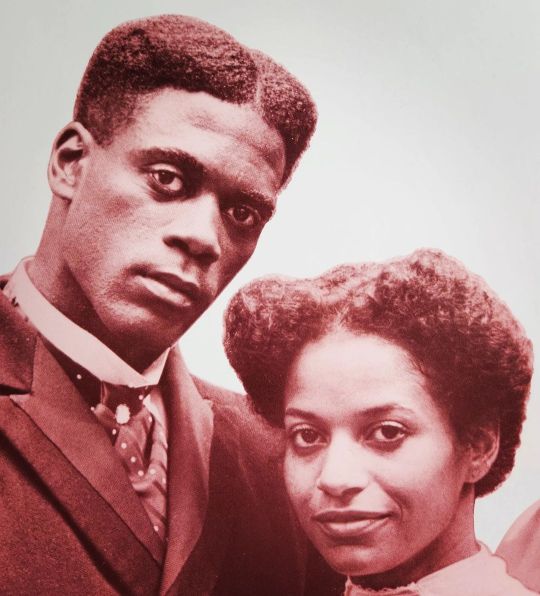
Ragtime-Original Vintage Movie Poster of Milos Forman's New York Epic with James Cagney, Elizabeth McGovern and Howard E. Rollins Jr. #ragtime #takingoff #howarderollins #debbieallen #milosforman #elizabethmcgovern #vintagecinemaart #movieposter https://www.instagram.com/p/CpBubmcscj-/?igshid=NGJjMDIxMWI=
#ragtime#takingoff#howarderollins#debbieallen#milosforman#elizabethmcgovern#vintagecinemaart#movieposter
1 note
·
View note
Text
Ragtime (Milos Forman, 1981)
La aportación más sorprendente y admirable al acierto de Ragtime es, sin duda alguna, la de Forman. Puede que no se trate de un film «de autor», sino «de productor», pero la labor del director es ejemplar en su modestia, y alcanza una sutileza, una profundidad y una perfección a las que ni en los tiempos felices de Pedro el negro y Los amores de una rubia se había aproximado. Porque no es sólo que haya sabido ordenar el embotellamiento de tráfico en el interior de una factoría que supone el rodaje de una superproducción ambientada en el pasado, ni que se las haya apañado para hacer con claridad, gracia y fluidez las transiciones de una historia a otra, de un escenario al siguiente y de unos personajes a sus opuestos sin perder el equilibrio, gracias al ágil y continuo «relevo» de tramas narrativas, siempre en vigor, hasta cuando quedan momentáneamente «suspendidas» y son suplantadas por sus complementarias.
Ni hay que insistir en que decorados, vestuario, fotografía (Miroslav Ondricek), música (Randy Newman) y los restantes componentes son impecables y útiles, sin atraer hacia sí mismos la atención del espectador, es decir, que están admirablemente integrados y coordinados por el director. Lo que me maravilla de verdad es la habilidad de Forman como retratista, pues no se conforma con escoger los rostros más adecuados —aunque no sean taquilleros— y dirigir a todos los intérpretes magistralmente (James Olson, Mary Steenburgen, Brad Dourif, Elizabeth McGovern, Howard E. Rollins, James Cagney, Norman Mailer, Robert Joy, Mandy Patinkin, y hasta los espectros de Pat O'Brien y Donald O'Connor están perfectos), sino que consigue descubrirnos nuevas facetas, rasgos adicionales, caras ocultas de los personajes en el curso de la película, es decir, que permite que vayamos conociéndoles poco a poco y que nos demos cuenta de que a menudo la primera impresión que tuvimos de ellos era equivocada, apresurada, convencional, incompleta o simplista. Así, por ejemplo, Evelyn Nesbit (E. McGovern) parece la tonta que le hacen ser hasta que la vemos un momento a solas, en libertad, sin posar ni tener que representar un papel —en la bulliciosa calle de emigrantes, cuando conoce a Tateh (M. Patinkin) y su niña—, para luego ser otra vez anulada como persona; del mismo modo, la Madre (Mary Steenburgen, la inolvidable heroína de Los pasajeros del tiempo, se nos puede antojar demasiado rígida en sus funciones de ama de casa acomodada y puritana cuando la vemos de perfil, pero se revela tal como en el fondo es aun antes de que la historia nos lo confirme, en cuanto Forman la encuadra de frente, mirándola a los ojos; esto sucede también con esos motores de la acción que son el Hermano Meno (B. Dourif, el de Sangre sabia) y Coalhouse Walker, Jr. (H. E. Rollins), y, sobre todo, con el que, sin que uno lo advierta mientras ocurre, más hace y más cambia, más se revela y mejor llegamos a conocer, el Padre (James Olson, prodigioso), probablemente el más patético y modesto de todos, el menos llamativo y pintoresco y el que, en el recuerdo, acaba por resultar, pese a lo antipático y pesado que parece al principio, el menos habitual y el más apreciable: la pausada discreción con que el paso del tiempo va desvelando su secreto a partir del poso que deja en nuestra memoria insinúa el método —si puede calificarse así— empleado por Forman en toda la película.
Sólo por haber creado este personaje —con una densidad, una riqueza y una presencia que no deben nada al libro—, Forman merece admiración, porque pocos cineastas actuales son capaces todavía de infundir cinematográficamente tanta vida, tal cantidad de biografía no narrada. Pero no es sólo eso: en Ragtime hay mucho más, sin que sobre nada; si acaso, hubiese deseado que durase un par de horas más, para que pudiese contarnos entera y a su ritmo la historia del emigrante eslavo que acabó convertido en director de cine pionero y de su hijita rubia.
• • •
El ragtime es un estilo de tocar el piano en el que la mano izquierda, muy móvil, confiere una tonalidad grave a los tiempos fuertes y otra más aguda a los débiles, mientras la derecha se ocupa de exponer sincopadamente la melodía y diversos adornos. En general, se interpretaban varios temas encadenados por interludios de dos o cuatro medidas. Al principio, solían ser piezas escritas, que se tocaban sin improvisaciones, aunque luego se utilizaron como base a partir de las que ejecutar variaciones. Como advierte E. L. Doctorow en la cabecera de su novela, citando a Scott Joplin nada menos, «nunca es bueno tocar el ragtime rápidamente...».
• • •
Ragtime (1974-75) es la cuarta novela de Doctorow, nacido en New York City en 1931 (un año antes que Forman en Praga), y tuvo un gran éxito de ventas. La primera, Welcome to hard times (1960), es un western digno de tan hermoso título, y fue llevada al cine en 1967 por Burt Kennedy, también sin repercusión alguna; de la segunda no se suele mencionar ni el nombre, Big as life; la tercera gustó mucho a la crítica y a ciertos lectores expertos, escritores sobre todo. Trataba sobre los Rosenberg, y se llamaba The book of Daniel (1971); Doctorow vivió de becas mientras escribía Ragtime, y sus numerosas reediciones no le convirtieron en un fabricante de best-sellers tipo Hailey, Michener, Forsyth o Lapierre & Collins: en 1979 estrena un drama, Drinks before dinner, y en 1980 publica, de nuevo con éxito, pero sin apartarse de sus preocupaciones en lo más mínimo, su quinta novela, Loon lake.
• • •
Cuento esto porque casi todo lo que he leído acerca de la película revela un desconocimiento y una falta de interés por uno de sus «autores» que me resulta incomprensible, ya que, sin temor a exagerar, y en cuanto mero lector, no me es fácil pensar en otros cinco escritores norteamericanos surgidos en los 60 y 70 más apasionantes y prometedores que Doctorow, y a él se deben, sin duda, buena parte de los valores de la película dirigida por Forman. Es curioso, por otra parte, que la novela se recuerde como algo enorme e inasible, ya que ni su estructura —aunque fragmentaria— es complicada ni su volumen es desmedido (unas doscientas veinte páginas de edición de bolsillo corriente). Prueba de ello es que cuando al productor italiano trasplantado a Hollywood Dino de Laurentiis se le metió en la cabeza convertirla en película, todo el mundo le tomó por loco y se dio por imposible la adaptación. Con buen ojo, De Laurentiis pensó que Robert Altman —que acababa de rodar Thieves like us, California split, aún inéditas, y Nashville— podría dirigirla, aunque después se pelearan y el proyecto quedase en el aire hasta que, por fin, con un cambio de enfoque que estoy lejos de lamentar, De Laurentiis optó por el refugiado checo Milos Forman.
De modo que De Laurentiis —suyo es el proyecto y el empeño, suyo el dinero y el riesgo, suyo el mérito de haber puesto a disposición del director el equipo técnico y artístico, y los cuantiosos medios funcionalmente empleados— es un segundo responsable del éxito artístico de esta película.
• • •
Algo menos valiosa parece en cambio la contribución del para mí desconocido guionista Michael Weller, pues su trabajo se ha limitado a simplificar la novela por supresión de personajes (Houdini, Emma Goldman, Henry Ford, J. Pierpont Morgan) y de numerosos episodios de las historias de otros (en particular de Tateh y del Hermano Menor), con el resultado de que la delirante tragedia a lo Von Kleist (Michael Kohlhaas), de Coalhouse, Walker, Jr., en lugar de interrumpir e interferir las restantes se convierta en eje principal de la película, por lo que ésta concluye forzosamente en anticlímax.
Afortunadamente, lo que Forman no ha sido nunca es un «ilustrador de guiones»: la trama, por ingeniosa o compleja que pueda ser, es un armazón a partir del cual desarrolla su trabajo de director cinematográfico, que para él, como para muchos grandes cineastas americanos —nacidos o no en Estados Unidos—, se acerca más, sin duda, al de un intérprete que al de un compositor. Y hay que decir, para terminar ya, que Forman toca bien con la mano izquierda siempre, pero que con la derecha es un maestro del ragtime.
Miguel Marías
Publicado en el nº 17 de Casablanca (mayo de 1982)
1 note
·
View note
Text
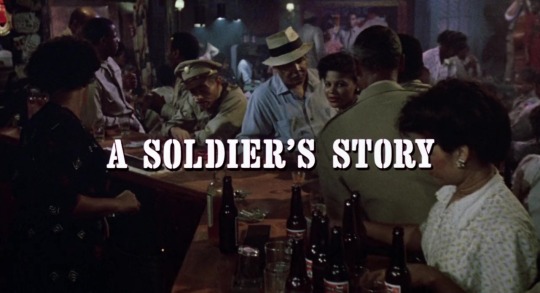
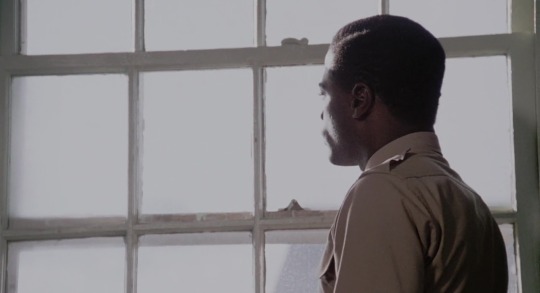
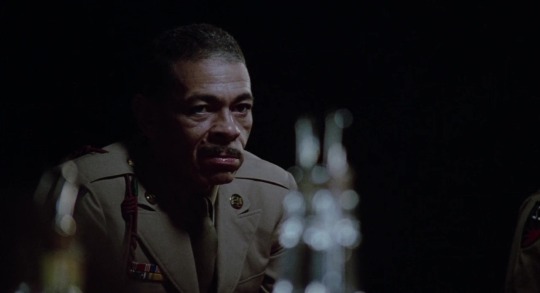
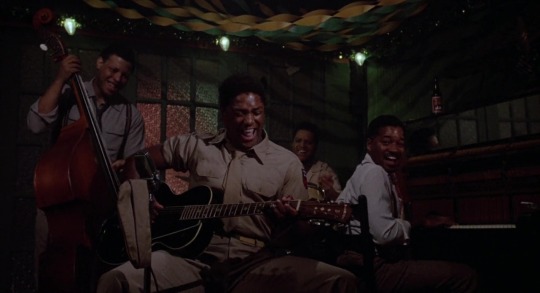
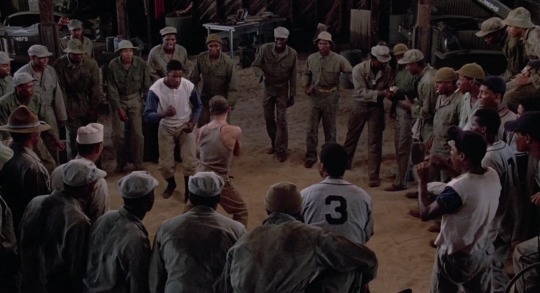
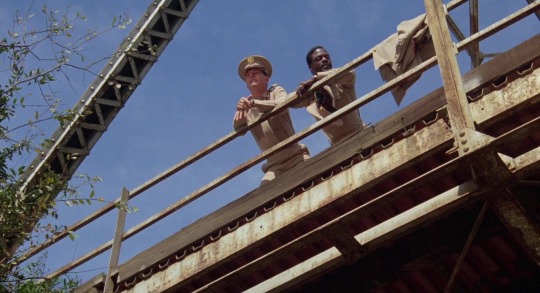
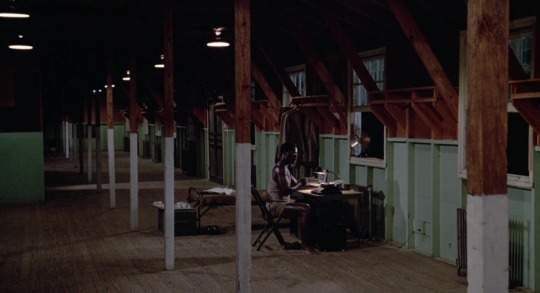
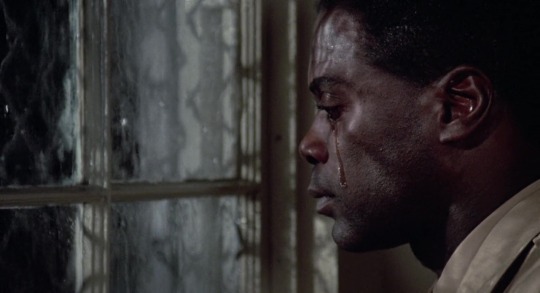
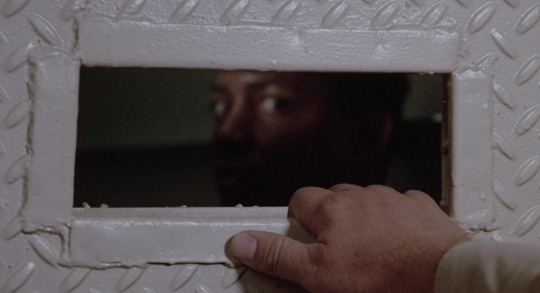
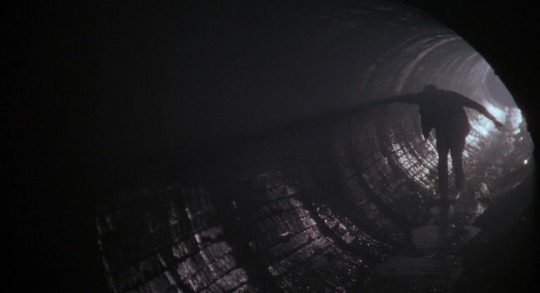
A Soldier's Story (1984)
Director - Norman Jewison, Cinematography - Russell Boyd
"You know the damage one ignorant Negro can do? We were in France in the first war; we'd won decorations. But the white boys had told all them French gals that we had tails. Then they found this ignorant colored soldier, paid him to tie a tail to his ass and run around half-naked, making monkey sounds. Put him on the big round table in the Cafe Napoleon, put a reed in his hand, crown on his head, blanket on his shoulders, and made him eat *bananas* in front of all them Frenchies. Oh, how the white boys danced that night... passed out leaflets with that boy's picture on it. Called him Moonshine, King of the Monkeys. And when we slit his throat, you know that fool asked us what he had done wrong?"
#scenesandscreens#A Soldier's Story#norman jewison#Russell Boyd#Howard E. Rollins Jr.#Adolph Caesar#Art Evans#david alan grier#david harris#denzel washington#Dennis Lipscomb#Larry Riley#robert townsend#William Allen Young#john hancock#patti labelle#Trey Wilson#Wings Hauser#Scott Paulin#mike williams
41 notes
·
View notes
Photo
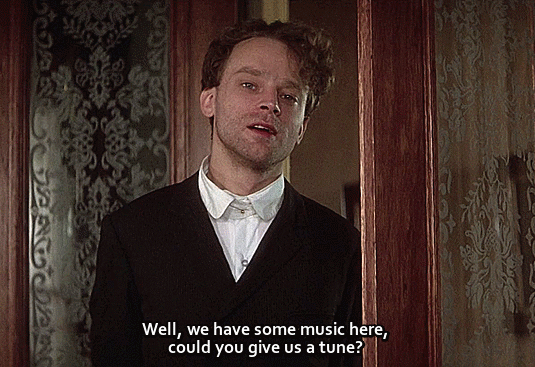
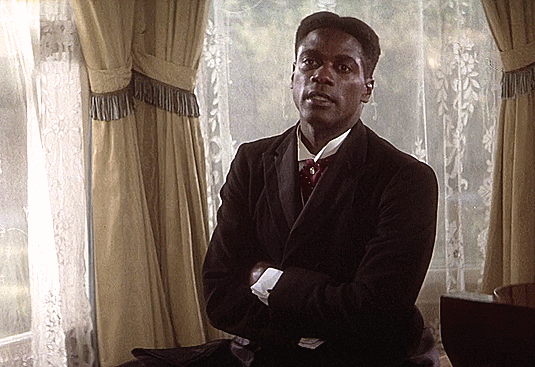
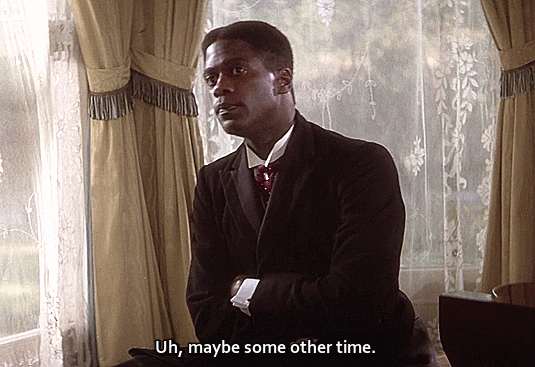
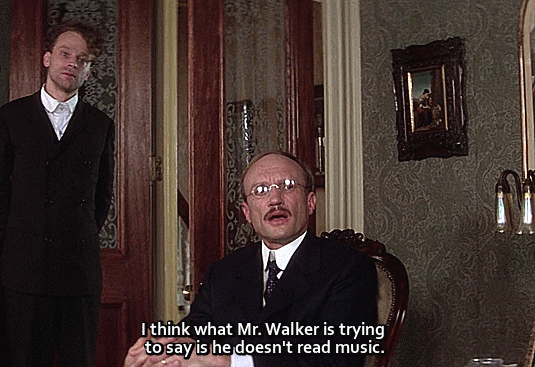
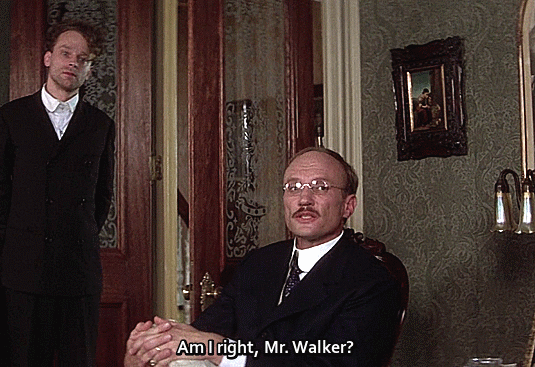
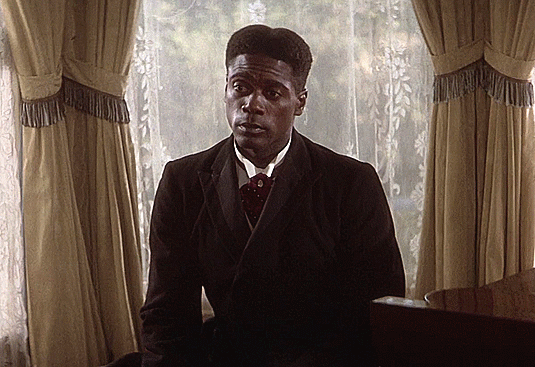
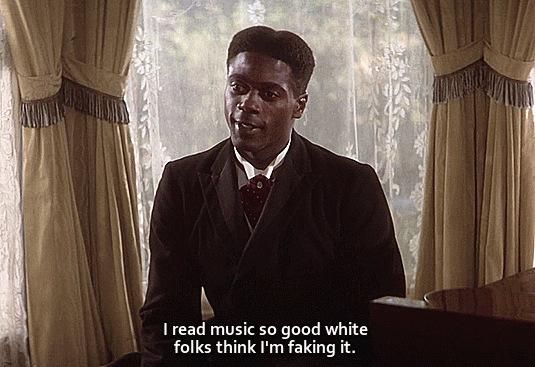
Ragtime (1981)
Bonus: laughing it away.
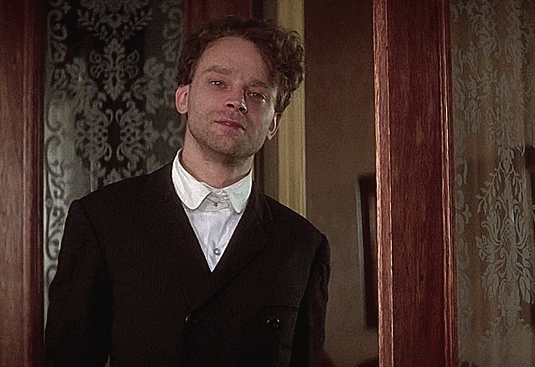
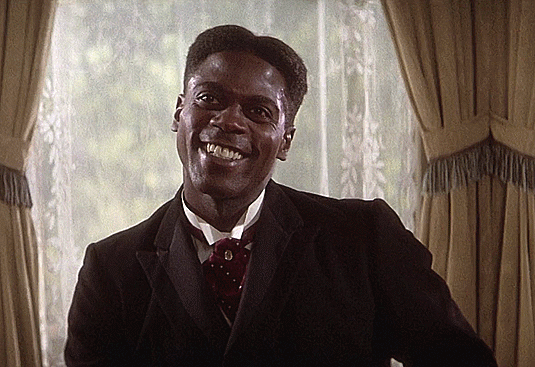
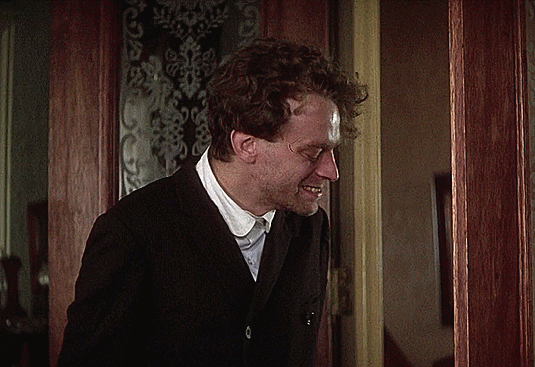
103 notes
·
View notes
Text

A Soldier's Story (1984). An African-American officer investigates a murder in a racially charged situation in World War II.
While it'll never quite stack up when it comes to the In the Heat of the Night comparisons (the two films share a director and thematic throughline after all), this is still an excellent, intelligent thriller grounded in great performances and a sharp script. Denzel Washington's the clear standout (I can't believe this is only his second feature!), but he's bolstered by a great cast all around. Just a really great watch. 8/10.
#a soldier's story#1984#Oscars 57#Nom: Best Picture#Nom: Supporting Actor#Nom: Adapted Screenplay#Norman Jewison#charles fuller#howard e rollins jr#adolph caesar#denzel washington#art evans#David Alan Grier#1940s#america#american#race#crime#8/10
78 notes
·
View notes
Photo
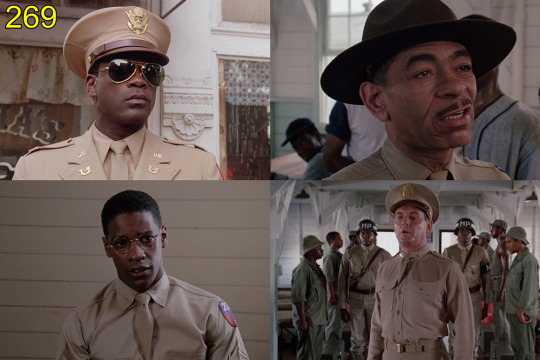
269. A História de um Soldado (A Soldier’s Story, 1984), dir. Norman Jewison
#cinema#norman jewison#howard e. rollins jr.#adolph caesar#denzel washington#dennis lipscomb#american movies#1980s movies#crime#drama#mystery#based on play by charles fuller#soldiers#military lawyer#civil rights#racial discrimination#racial tension#homicide investigation#revenge killing#racial segregation#army life#abuse of power#murder mystery#academy awards nominee#golden globes awards nominee#dga awards nominee#cult director#cinefilos
4 notes
·
View notes
Photo
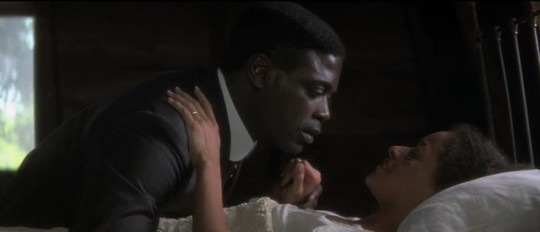
Debbie Allen and Howard E. Rollins Jr. in Ragtime (Miloš Forman, 1981)
40 notes
·
View notes
Photo
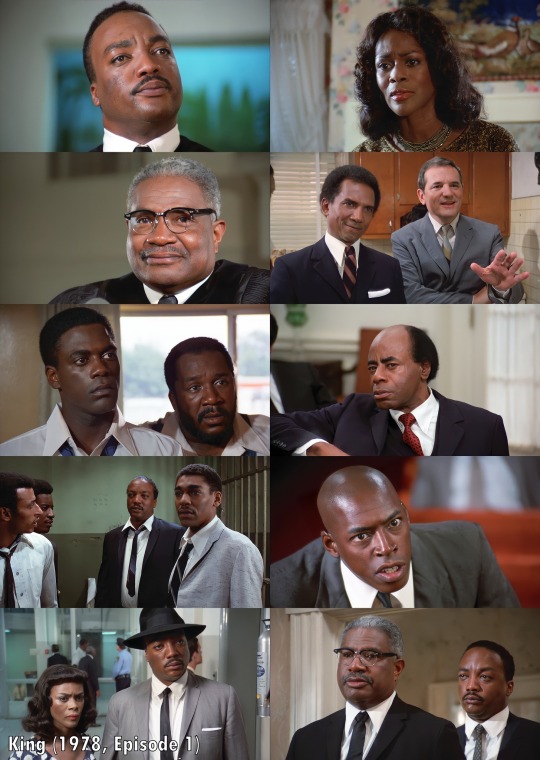
"King" (1978, Part I) was an NBC made-for-television movie about Dr. Martin Luther King Jr life written and directed by Abby Mann. The film stars Paul Winfield and Cicely Tyson as Martin and Coretta Scott King, respectively. Both actors were already successful in their careers from the 1972 film "Sounder," so they already had the chemistry necessary to pull off this task.
NBC released the miniseries ten years after the assassination of Dr. King, so the tragedy was a reminder for many people when the series aired. Not only that, but many people involved with Dr. King were still active in his legacy. The film did ignite some controversy from several angles. In general, Dr. King involved himself in so many different things at high levels that it would be impossible to nail down all the details of how situations unfolded and, more so, how he responded from an emotional and psychological perspective. According to the Courier-Post, Saturday, February 11, 1978, in an article by Jerry Buck (The Associated Press), civil rights leaders said that Mann portrayed Kings as "cowardly and frightened." However, Mann countered by saying, "the film may have flaws, but showing him as a coward isn't one of them. He may be afraid, but that makes him all the more courageous." Additional criticism included the treatment of Dr. King by former FBI director J. Edger Hoover who attempted to discredit King.
There are many actors in this miniseries, so it can be challenging to keep up with everyone, but many familiar faces play significant roles. But in part one, Howard E. Rollins stars in his second film playing King's aid, Andrew Young. Part one is an intense drama. Everyone does an excellent job of bringing the life surrounding Dr. King in a way that will touch people emotionally. However, as mentioned earlier, some details and facts may need to be included or corrected, especially considering more than ten years are required to research the life of Dr. King. But, for educational purposes, this film did well, and I recommend it for viewing.
Director: Abby Mann
Writer: Abby Mann
Starring Paul Winfield, Cicely Tyson, Ernie Hudson, Howard E. Rollins, Al Freeman Jr., Roscoe Lee Browne, Ernie Lee Banks, Ossie Davis, Steven Hill, Lonny Chapman, Cliff De Young, Clu Gulager, William Jordan, Warren J. Kemmerling, Lincoln Kilpatrick, Kenneth McMillan, David Spielberg, Dolph Sweet, Dick Anthony Williams, Art Evans, Frances Foster, Charles Robinson, Roger Robinson, Sheila Frazier, Tony Bennett, Julian Bond, Bill Cobbs
Storyline
Part one of a three-part biographical portrait of civil rights leader Dr. Martin Luther King Jr. covers his decision to enter the ministry, his marriage, his role in the Montgomery bus boycott, and his efforts to desegregate other public accommodations.
https://www.daarac.ngo
https://www.daaracarchive.org/.../king-1978-part-one-tv...
Available on Blu-ray and streaming services.
https://www.amazon.com/King-Martin-Luther.../dp/B00QK4AQ3G
0 notes
Photo
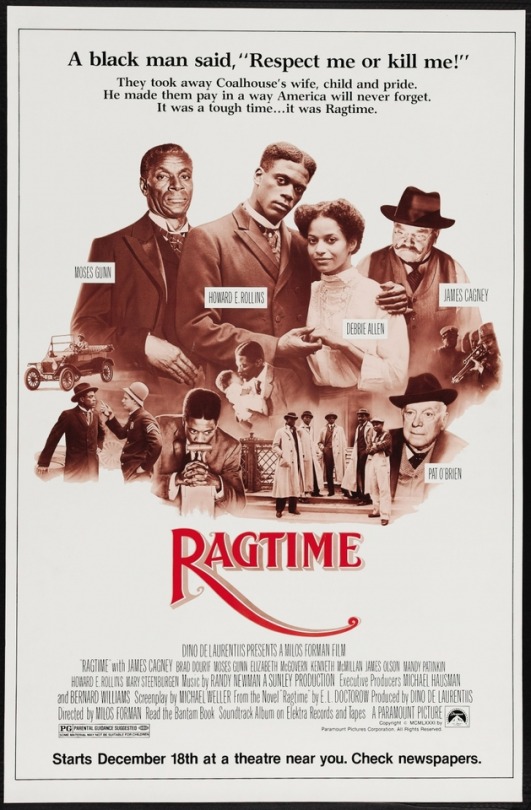
RAGTIME (1981) - Milos Forman
#ragtime#milos forman#James Cagney#Brad Dourif#Moses Gunn#Elizabeth McGovern#Kenneth McMillan#Pat O'Brien#Mary Steenburgen#Debbie Allen#Robert Joy#Howard E. Rollins Jr.#film#movie#cinema#racism#usa#america
17 notes
·
View notes
Photo
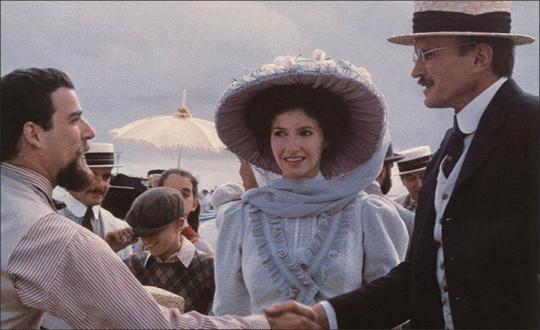
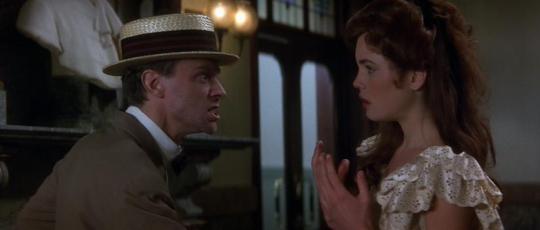
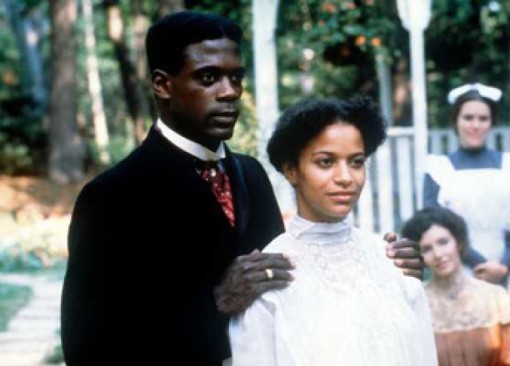
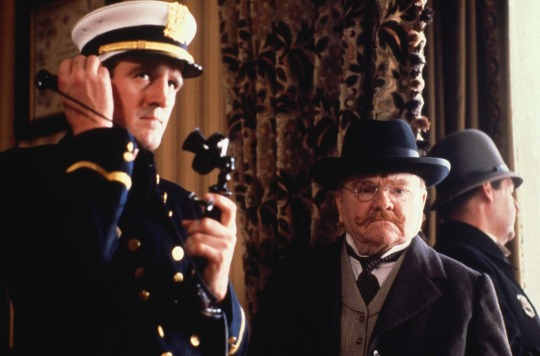
Ragtime
Directed by Milos Forman and released in theaters in 1981.
There’s a lot going on in this movie. A lot I didn’t realize when my grandfather took me to see this in theaters when I was 11. And still more after I read about the actors and listened to Milos Forman talk about the movie for the DVD release.
Top left - you have a husband and wife at the seaside meeting the bearded gentleman who is directing a movie. The bearded gentlemen is Inigo Montoya (Mandy Patinkin) - but I didn’t freaking know that until I tried to figure out who the actor was. The married couple have been through an ordeal and have custody of the baby of a wanted man. They have gone to the seaside to rest.
Brad Dourif and Elizabeth McGovern are at top right. They have a fling - he really falls for her. She is a ditzy show girl but they are both really good and I just am a bit jealous of Brad Dourif’s body of work. It has spanned so many genres. Starting with Cuckoo’s Nest, to the voice of Chucky the murdering doll, to Doc Cochran on Deadwood, and now I see him as the lovelorn activist using his skills for what he believes is right even if it is a lost cause. Really good interesting characters. Was thrilled to see him in Ragtime.
Bottom left are Howard E. Rollins, Jr. and Debbie Allen. A testament to Debbie Allen here because I didn’t even know it was her until the end of the movie. She cries the whole time. Definitely plays agains type as the sort of simple subservient woman. She abandons her baby, Harry E. Rollins, Jr. is her baby daddy. The family at the top left end up taking her and the baby in. Howard E. Rollins tries to come back to get his woman and son but he is mistreated terribly due to his race and he can’t stand it one more minute.
Mother-fucking James Cagney is at the bottom right. I’ve seen a few James Cagney movies - this is not one of those. He is so good as the police chief - so good with his dialog - you barely notice that he is basically stationary throughout all of his scenes. I think he was not well when the movie was being shot. Milos Forman said he was wonderful to work with and an outstanding actor. And he was really fun to watch in a more modern film.
So there’s a lot going on in this movie. I liked it. It’s 2-1/2 hours so you have to commit - I watched it over 3 days. And the end is what I expected and then is not what I expected. It’s a bit noir - a bit twisted.
So I recommend this one from 1981 - a period piece with many recognizable faces and good subject matter - not to mention - great music.
#ragtime#milos forman#howard e rollins jr#debbie allen#brad dourif#elizabeth mcgovern#mary steenburgen#mandy patinkin#james olson#james cagney#1981 movies
8 notes
·
View notes